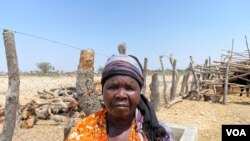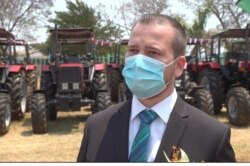A U.S.-backed Zimbabwean charity is helping small farmers in the country improve both the quality and quantity of their yields in order to increase incomes and become more food secure. "Feed the Future Zimbabwe" says small farms comprise 70 percent of Zimbabwe's farmers and making them more efficient could mark an important turnaround for the impoverished country's economy.
It’s a tale of two ways of life in Rusununguko village in Chirumanzi district about 200 kilometers south of Harare: Life for the haves and the have-nots in this arid area.
Those who have utilities like electricity and running water attribute it to dairy farming. That's the story for 80-year-old Felistus Gwatipedza.
She started her farm about five years ago – thanks to Feed the Future Zimbabwe. Now she sells milk to a company listed on the Zimbabwe Stock Exchange and is able to look after her orphaned grandchildren.
"In my life," she said, "there’s been change since I started dairy farming. I never used to get money. Look at how old I am, she said. I lost my daughter, a mother of two. I look after them. I have bought stuff such as a plow for my home to thrive."
Feed the Future Zimbabwe is a local non-governmental organization funded by the U.S. Agency for International Development. The group says it has empowered more than 13,000 small farmers over the past five years.
Kudakwashe Ndoro says his organization trains farmers on how to improve product quality and yields, while holding down costs and ultimately making the country more food secure.
“Whether [the] government is giving inputs, the farmer must also have something substantial which he has to be putting in, not just receiving. If a donor is coming in with a project, something substantial has to be invested by the farmer, which we can call co-investment, not just what we are seeing where people may be asked to put up a road, do this, food for work. No that’s not enough,” Ndoro said.
The Zimbabwe government says small famers have an important role to play in the country’s economy and will be the beneficiaries of a government initiative to give them the seeds and fertilizer they need.
Vangelis Peter Haritatos is Zimbabwe’s junior agriculture minister.
“Smallholder farmers are critical in this whole equation of food security. We are targeting 1.5 million households and 1.8 metric tons of cereal crops, 360 metric tons of oil seeds. In the high rainfall areas we will be distributing maize and soybeans for the oil seeds. Lower rain areas we will distributing traditional grains such as sorghum as well as sunflower,” Haritatos said.
With this initiative and training from Feed the Future Zimbabwe and a forecast of a favorable rainy season ahead, farmers are hoping this year - after two decades - Zimbabwe will begin to regain its status as the breadbasket of southern Africa.






